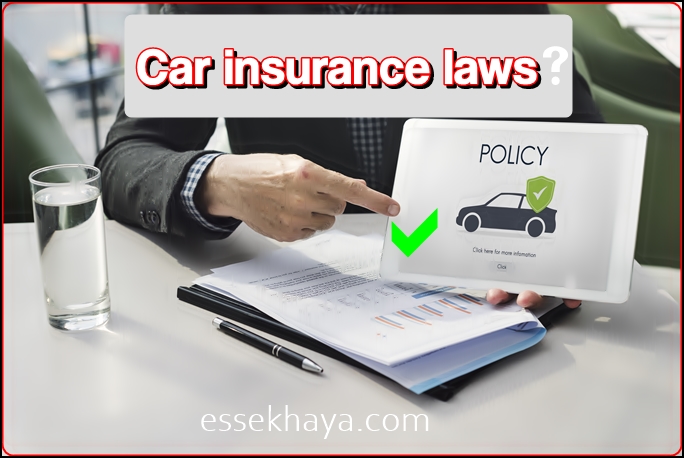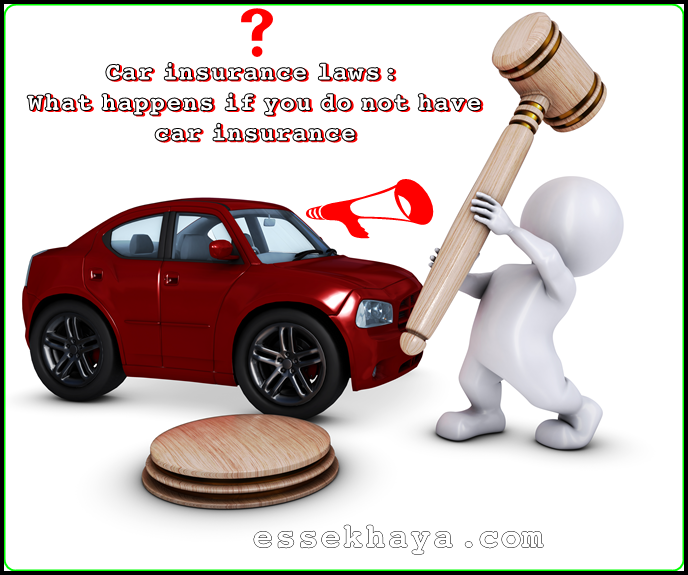Avoid Being Stopped Without Adequate Protection by Maintaining Adequate Auto Insurance
Accidents will always happen in life. Because of this, having vehicle insurance is not only crucial; it is also a legal requirement. Given the rising number of drivers on the road, it just takes one careless action by another motorist to place you in a precarious scenario. However, did you realize that only having vehicle insurance is insufficient protection? Each state has its own set of rules regarding vehicle insurance, which, if not adhered to, may result in severe penalties or even legal action. We will go over some of the most crucial components of car insurance regulations and how they effect your coverage in this article so that you are never caught driving without the proper protection while you are on the road.
 |
| Auto Insurance Laws: Don’t Get Caught without Proper Protection |
The Legal Foundations for Automobile Insurance
The purpose of laws mandating car insurance is to protect drivers from the financially ruinous results of accidents with other vehicles. Every state requires drivers to have at least a minimal amount of vehicle insurance. The minimum amount of coverage that must be obtained varies from state to state, but in most circumstances, it is enough to cover the expenses of one person's accident-related medical treatment and property damage.
Some jurisdictions mandate that drivers get supplemental insurance, such as collision or comprehensive insurance, which covers damages to your car resulting from events other than accidents, such fire or theft. These insurance plans are an illustration of the extra protection that your state can mandate. Most lenders will demand that borrowers who wish to finance their car get insurance that includes collision and comprehensive coverage.
If you are involved in an accident, your vehicle insurance policy will pay for the damages brought on by the accident up to the policy's maximum, and it will do so regardless of who was at blame. You will be responsible for covering any extra costs if the damages exceed the insurance policy's maximum coverage limit.
Car Insurance Rates Surge as Accident Frequency Rises - learn more
How Insurance Regulation Operates
Insurance regulation refers to the method through which state and federal organizations keep an eye on insurance firms to make sure they are operating legally and correctly. These rules are designed to protect consumers from insurance fraud and to make sure that insurers have enough money on hand to cover claims. These limitations also protect customers from being taken advantage of by insurance.
Many alternative methods may be used to regulate the insurance sector. For instance, the majority of states have a post known as "insurance commissioner" who is in charge of overseeing the industry and making sure that state laws are being followed. Additionally, insurance businesses must get licenses from the insurance departments of each state where they do business and adhere to the laws and rules set out by those agencies.
State regulators may interact, exchange information, and plan their operations on a federal level via the National Association of Insurance Commissioners (NAIC). The NAIC is also in charge of creating sample laws and rules that the states may choose to adopt if they so chose.
In addition to these more fundamental regulatory bodies, the insurance business is also governed by a number of specialized organizations, each of which is in charge of overseeing a specific aspect of the industry. For instance, the Federal Deposit Insurance Corporation (FDIC) is in charge of monitoring the regulation of banks and savings organizations, while the National Credit Union Administration (NCUA) is in charge of the supervision of credit unions. If you have any questions about how your financial institution, whether a bank or a credit union, is being regulated, you are invited to contact one of these regulating bodies directly.
Various Types of Automobile Insurance
Consider acquiring one or more of the several forms of insurance offered if you want to be sure that you are safeguarded in the case of an accident involving your car. These are listed below:
-Liability policy: If you are found to be at fault for an accident that causes property damage or personal injury, this policy will protect your financial interests. You must be aware that any injuries or damage you cause to yourself are not covered by this insurance.
-Collision insurance: Regardless of who was at fault for the collision, this policy will cover the cost of repairs to your automobile if it is damaged as a consequence of an accident.
-Comprehensive policy: If your automobile sustains damage from a cause other than an accident, such as a fire, theft, or vandalism, this policy will pay for the necessary repairs or replacement. -Liability insurance: If your car is damaged in an accident, this insurance will cover the cost of replacement or repairs.
-Personal Injury Protection (PIP): Regardless of who was at fault for the occurrence, this coverage can help with covering your medical costs and lost income in the event that you are hurt as a consequence of an accident.
-Uninsured/underinsured motorist coverage: This policy will provide financial security in the event that you are involved in an accident with a driver who is either uninsured or underinsured relative to the damages they are responsible for.
Administrative requirements and state law
All drivers are required by law to have a minimum amount of liability insurance, while the details of this need differ from state to state. Drivers must have insurance that includes comprehensive and collision in certain places, including New York, but are just required to carry liability insurance in other states.
To learn what sort and how much insurance is necessary, you should always check with your state's insurance authority. The best method to guarantee that you have enough protection in the case of an accident is to do this. Keep in mind that having insurance is always a good idea even if your state does not need you to have it in order to be financially protected in the event that you are involved in an accident.
 |
| Car insurance laws: be protected and avoid getting caught without losses |
Understanding Deductibles, Premiums, and Claims Concepts
One of the insurance coverage types that is regarded as being among the most necessary for drivers to have is auto insurance. They are legally required to obtain it in most places, so they have financial protection in case of an accident. Deductibles, premiums, and claims make up the three main elements of auto insurance coverage.
The deductible is the amount of money that a policyholder must fork up out of cash before their insurance provider starts to pay for accident-related expenses. Your premium (the amount you pay each month) will be less expensive if you have a greater deductible. A policyholder will file a claim with their insurance company in the event that they have been in an accident and want to be reimbursed for damages.
The rates you pay may vary depending on your driving history, the car you drive, and where you reside. Frequently, premiums are paid each month. Insurance companies weigh both the possibility of you getting into an accident and the amount of money it would cost them if you did when making their judgments. In proportion to the estimated degree of risk you pose, your premium will go up.
Most states require motorists to have a minimum level of liability insurance on their vehicle insurance policies. State-by-state variations in these limits mean that they often fall short of covering all accident-related costs. Because of this, choosing a car insurance coverage requires having a firm grasp of deductibles, premiums, and claims. Verify that you are getting the required coverage at a price that is affordable for you.
Best Personal Loans in the USA for April 2023
What to Do if You're in an Accident and Need Advice
In the event that you are involved in a vehicle accident, you should take the following actions:
1. As soon as you can, come to a full stop with your vehicle.
2. Check to see if anybody is hurt, and call 911 if they are.
3. Provide the other motorist or drivers with the details of your insurance.
4. If it's possible, snap pictures of the accident site.
5. Inform your auto insurance provider about the crash and submit a claim for reimbursement.
Looking for the Cheapest Rates and Coverage
You want to ensure that you are getting the greatest rate and coverage for your specific scenario when it comes to vehicle insurance. You may use the following advice to help you in your hunt for the best deal:
1. Be aware of the minimum insurance requirements in your state. You must be aware of the rules that apply in your own state since the laws regulating vehicle insurance vary from state to state. Visit the website of your state's insurance department to learn more about this.
2. Compare the rates provided by many insurance. You may start searching for the finest insurance package after you have established the bare minimum of protection required by law in your jurisdiction. Make it a point to get price quotes from at least three different insurance companies so that you can assess how competitively priced each one is.
3. Consider extra covering options beyond the basics. If you have a loan on your car or live in a neighborhood with a lot of violent crime, you may want to consider adding more coverage to your auto insurance policy. As a consequence, the price of your premium could increase, but the peace of mind that comes from knowing that you are completely insured in the event of an accident or theft can make it worthwhile.
4. Read the smallest print possible before consenting to the conditions of a policy. Don't sign anything until you've given the coverage they provide great thought after choosing an insurance company. With a clear grasp of what is and isn't covered by your plan, you won't be caught off guard if you need to file a claim in the future.
Myths Regarding Legal Automobile Insurance Requirements
There are many misconceptions and fallacies surrounding the laws governing vehicle insurance. Among the most popular ones are some of the following:
1. You are not required to carry insurance if you have a spotless driving record.
2. Your credit score will have no impact at all on the cost of your insurance.
3. No matter who caused the collision, your auto insurance company will cover any damages to your car.
4. Drivers are not required to get vehicle insurance in certain states.
5. You have the right to terminate your coverage if you decide you no longer need vehicle insurance.
Conclusion
Auto insurance laws is required by law to protect all drivers and to make sure that everyone is accountable for any harm they may do. Before you get behind the wheel, it is crucial that you comprehend these regulations completely since doing so might result in serious legal repercussions. To protect your safety and to comply with all relevant state laws, do your research, shop about for the best cost, and get the bare minimal amount of vehicle insurance coverage. Ignorance is not a valid defense for failing to maintain a safe driving environment.
Comments
Post a Comment